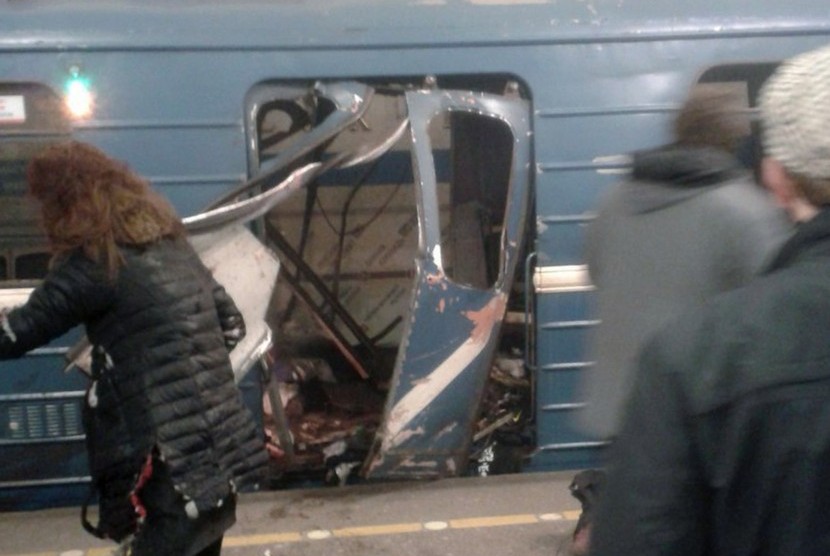REPUBLIKA.CO.ID, ST PETERSBURG -- A Kyrgyz-born suicide bomber was behind a blast on the St Petersburg subway that killed 14 people, Russian investigators say.
There was no immediate claim of responsibility for the Monday afternoon (local time) attack, which came while President Vladimir Putin was visiting the city, Russia's second biggest and Putin's hometown.
Russia's Health Minister on Tuesday raised the death toll from 11 to 14 and said 49 people are still hospitalised.
City Hall authorities said there were several foreign nationals among those killed and injured but would not give details.
The Foreign Ministry of the Central Asian nation of Kazakhstan said one of its citizens has been killed in the attack. Residents have been bringing flowers to the stations near where the blast occurred.
Every corner and window-sill at the ornate, Soviet-built Sennaya Square station on Tuesday was covered with red and white carnations.
Also read: Indonesia extends condolences to Russia, Syria
Russian investigators identified 22-year old Kyrgyz-born man Akbardzhon Dzhalilov as the suicide bomber in Monday's blast.
The investigators also said that forensic experts found Dzhalilov's DNA on a bag containing a bomb that was found and deactivated at another subway station in St Petersburg on Monday.
Subway partially reopened but deserted
The Interfax news agency said authorities believed the suspect was linked to radical Islamic groups and carried the explosive device onto the train in a backpack.
The entire subway system in St Petersburg, a city of 5 million, was shut down and evacuated before partial service resumed six hours later.
"There'll be an enhanced police presence, para-military presence in St Petersburg and large Russian cities," Bobo Lo, expert in Russian security policy, told the ABC's Lateline program.
"But, probably not major changes in security policy. There have been relatively few terrorist incidents in Russia."
Typically crowded during the rush hour, the subway on Tuesday morning looked almost deserted as many residents opted for buses.
"First, I was really scared," said Viktoria Prishchepova who did take the subway.
"I didn't want to go anywhere on the metro because I was nervous.
"Everyone was calling their loved ones yesterday, checking if they were OK and how everyone was going to get home."
Monday's explosion happened as the train travelled between stations on one of the city's north-south lines.
The driver appeared in front of reporters on Tuesday looking tired but not visibly shaken by the events of the previous day.
Alexander Kavernin, 50, who has worked on the subway for 14 years, said he heard the sound of a blast while his train was running, called security and carried on to the next station as the emergency instructions prescribe.
"I had no time to think about fear at that moment," he said.
The decision to keep moving was praised by authorities as aiding evacuation efforts and reducing the danger to passengers who would have had to walk along the electrified tracks.
Four stations on the subway were closed again on Tuesday due to a bomb threat, but later reopened.
In the past 20 years, Russian trains and planes have been frequent targets of attack, usually blamed on Islamic militants.


